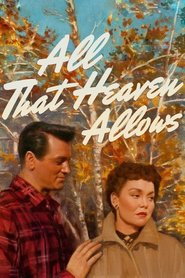
Douglas Sirk was a German Director who had escaped the Nazi Regime to Hollywood in the late 1930s. While in Germany he was an intellectual director who translated Shakespeare into German and directed film versions of Ibsen. After arriving in Hollywood he received his greatest success in making what was considered at the time Schlocky tear jerking woman pictures.
What the early critics of Sirk’s films missed in their criticisms was his subtle observations of the dark judgmental society that is, up until today, ingrained in the American way of life. That most of these early critics also missed his extravagant and impressive visual style is beyond me.
“All that Heaven Allows”, is a great example of both of these elements. It is a stark condemnation of sweet suburbia and it has some of the most beautifully filmed shots ever made.
In the film Jane Wyman plays late middle aged widow, Cary Scott who lives in her small town community and is ingrained in its white upper middle class society with all of its acceptable norms. She is already a few years past the death of her husband and is expected by her friends and grown children to marry an older member of this society. Instead she begins a sultry and passionate love affair with her much younger gardener. The films shows her being judged harshly by all that surrounds what was once her comfort zone. Her children are spoiled and selfish and her neighbors cruel and judgmental. The object of her desires is Ron Kirby (Rock Hudson who successfully portrays him by speaking almost in a quiet whisper all of the time). The affair causes a scandal in the town and despicable behaviors from her two children.
Wyman is wonderful in the role as she plays her desires, pain and anguish with subtle looks and expressive glances. The film also has very interesting sub characters. Her best friend Sara (Played wonderfully and with insidious glee by Agnes Moorhead) pretends to be on her side while relentlessly reminding Cary of “what people will say”. Her children, both in collage, and both pretending to be modern, are probably the most conformist of the lot. Especially when it comes to their mother. There is a wonderful scene when they first meet Ron and the son, who happily made cocktails to an old and boring (but rich) previous date of Cary’s, finally agrees, after the anguished request from his mother to make a cocktail for Ron. He does this with such disdain and non interest that Ron does not even agree to accept the drink.
There are strong hints of the hypocrisy that runs through this closed world when at the beginning of the film, at the country club that serves as the social center of Cary’s world, we are introduced to one of the middle aged members having a very young, blond girlfriend (or wife), who is accepted as being normal by the group. This is in stark contrast to Cary’s infatuation with Ron because she is a woman for whom it is shameful to fall for a handsome younger man.
The film is based in New England during the winter and contains numerous stunningly photographed shots in brilliant contrasting colors. There are images here of exceptional power. Ron’s cabin contains a large window wall that opens out to a brilliant white winter wonderland that is superimposed on the shadowed framing of Cary and Ron. Their most passionate moments are framed against this impressive and beautiful scenery. There are crane shot scenes that hover over groups of people during a dinner party that emphasizes their isolation from society. Probably the most impressive scene is the one where, after breaking off with Ron for the sake of her children, the children gift Cary a TV for a Christmas present. As soon as the new TV set is unpacked we are shown a shot that captures Cary’s image as it is reflected on the TV screen, looking miserable and trapped in its frame as if in a walled tomb. The TV’s promotion proudly claims in its advert, “Life’s parade at your fingertips”, making it a powerful and unflattering reflection on the American commercial world, comparing it to a tomb like life.
“All that Heaven Allows”, is a biting satire and stylistic tour de force that must be seen by film lovers everywhere.

